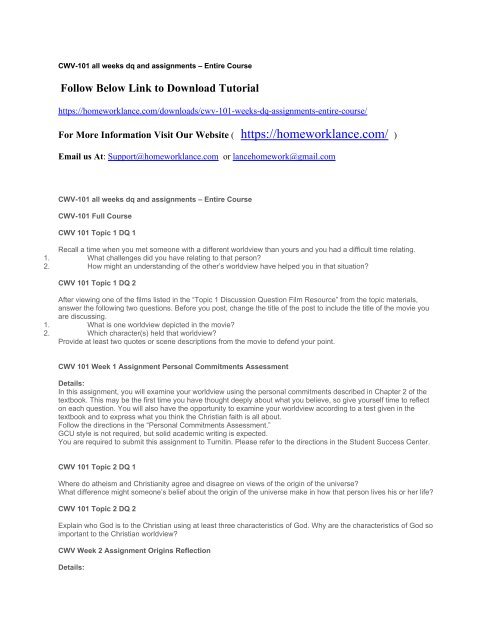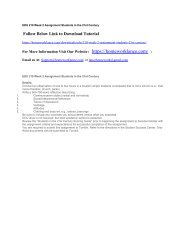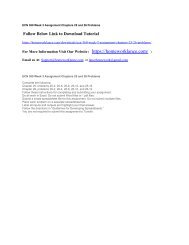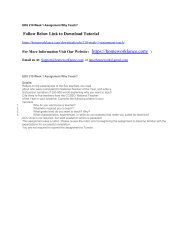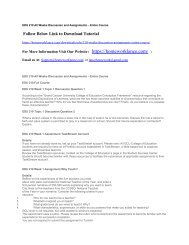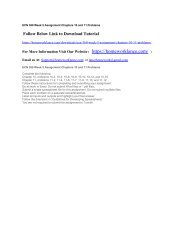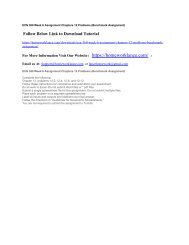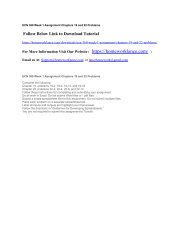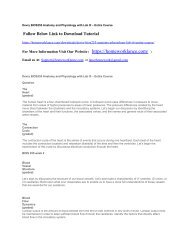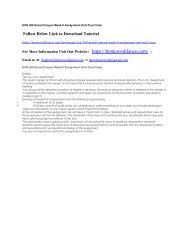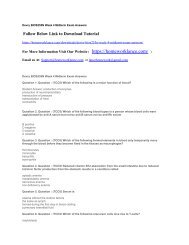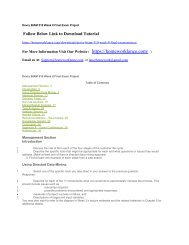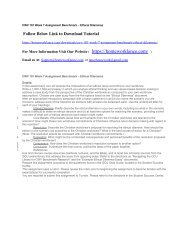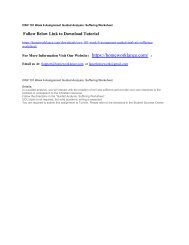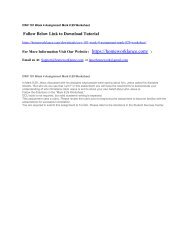You also want an ePaper? Increase the reach of your titles
YUMPU automatically turns print PDFs into web optimized ePapers that Google loves.
<strong>CWV</strong>-<strong>101</strong> <strong>all</strong> <strong>weeks</strong> <strong>dq</strong> <strong>and</strong> <strong>assignments</strong> <strong>–</strong> <strong>Entire</strong> <strong>Course</strong><br />
Follow Below Link to Download Tutorial<br />
https://homeworklance.com/downloads/cwv-<strong>101</strong>-<strong>weeks</strong>-<strong>dq</strong>-<strong>assignments</strong>-entire-course/<br />
For More Information Visit Our Website ( https://homeworklance.com/ )<br />
Email us At: Support@homeworklance.com or lancehomework@gmail.com<br />
<strong>CWV</strong>-<strong>101</strong> <strong>all</strong> <strong>weeks</strong> <strong>dq</strong> <strong>and</strong> <strong>assignments</strong> <strong>–</strong> <strong>Entire</strong> <strong>Course</strong><br />
<strong>CWV</strong>-<strong>101</strong> Full <strong>Course</strong><br />
<strong>CWV</strong> <strong>101</strong> Topic 1 DQ 1<br />
Rec<strong>all</strong> a time when you met someone with a different worldview than yours <strong>and</strong> you had a difficult time relating.<br />
1. What ch<strong>all</strong>enges did you have relating to that person?<br />
2. How might an underst<strong>and</strong>ing of the other’s worldview have helped you in that situation?<br />
<strong>CWV</strong> <strong>101</strong> Topic 1 DQ 2<br />
After viewing one of the films listed in the “Topic 1 Discussion Question Film Resource” from the topic materials,<br />
answer the following two questions. Before you post, change the title of the post to include the title of the movie you<br />
are discussing.<br />
1. What is one worldview depicted in the movie?<br />
2. Which character(s) held that worldview?<br />
Provide at least two quotes or scene descriptions from the movie to defend your point.<br />
<strong>CWV</strong> <strong>101</strong> Week 1 Assignment Personal Commitments Assessment<br />
Details:<br />
In this assignment, you will examine your worldview using the personal commitments described in Chapter 2 of the<br />
textbook. This may be the first time you have thought deeply about what you believe, so give yourself time to reflect<br />
on each question. You will also have the opportunity to examine your worldview according to a test given in the<br />
textbook <strong>and</strong> to express what you think the Christian faith is <strong>all</strong> about.<br />
Follow the directions in the “Personal Commitments Assessment.”<br />
GCU style is not required, but solid academic writing is expected.<br />
You are required to submit this assignment to Turnitin. Please refer to the directions in the Student Success Center.<br />
<strong>CWV</strong> <strong>101</strong> Topic 2 DQ 1<br />
Where do atheism <strong>and</strong> Christianity agree <strong>and</strong> disagree on views of the origin of the universe?<br />
What difference might someone’s belief about the origin of the universe make in how that person lives his or her life?<br />
<strong>CWV</strong> <strong>101</strong> Topic 2 DQ 2<br />
Explain who God is to the Christian using at least three characteristics of God. Why are the characteristics of God so<br />
important to the Christian worldview?<br />
<strong>CWV</strong> Week 2 Assignment Origins Reflection<br />
Details:
In this assignment you will summarize beliefs about the origin of the universe <strong>and</strong> life, including what Christians<br />
believe, what you believe, <strong>and</strong> how people’s beliefs about origins might impact how they live.<br />
After reflecting on Chapters 1 <strong>and</strong> 2 of Genesis, create a 15-slide PowerPoint presentation covering the following<br />
topics, paying particular emphasis on item three:<br />
1. Briefly explain the Genesis account of creation (first two chapters). The point is not to retell <strong>all</strong> aspects of the<br />
story in detail but just to make the message of the Bible clear.<br />
2. Explain <strong>and</strong> support your interpretation of the origin of the universe. Here you may want to address<br />
evolution, age of the earth, <strong>and</strong> whether or not it can be reconciled with the message of the Bible.<br />
3. Express how your underst<strong>and</strong>ing of the origin of the universe impacts your worldview, specific<strong>all</strong>y your view<br />
of God, of humanity, <strong>and</strong> responsibility to care for the earth.<br />
The first slide will be the title slide including your name <strong>and</strong> course information. The last slide(s) will be your list of<br />
references. You may use the textbook, the lecture, or other scholarly references. Cite <strong>all</strong> sources, including the Bible,<br />
as you would in an essay. The in-text citations should be placed on the actual slides in the presentation so the<br />
audience can see them. Put basic content on the actual slides <strong>and</strong> elaborate on <strong>all</strong> your points in the slide notes.<br />
In an effort to keep the file sizes reasonable, use no more than four low-resolution images. As in <strong>all</strong> aspects of this<br />
course, show respect for <strong>all</strong> other views, with no condescension. Keep your presentation positive <strong>and</strong> focused on<br />
what you believe, not on what you do not believe.<br />
Use one to three resources, other than the Bible.<br />
While GCU style format is not required for the body of this assignment, solid academic writing is expected, <strong>and</strong> in-text<br />
citations <strong>and</strong> references should be presented using GCU documentation guidelines, which can be found in the GCU<br />
Style Guide, located in the Student Success Center.<br />
This assignment uses a rubric. Please review the rubric prior to beginning the assignment to become familiar with the<br />
expectations for successful completion.<br />
You are required to submit this assignment to Turnitin. Please refer to the directions in the Student Success Center.<br />
<strong>CWV</strong> <strong>101</strong> Topic 2 Study Guide<br />
Details:<br />
Complete Topic 2 Study Guide to prepare for Topic 2 Quiz.<br />
This study guide is a tool designed to prepare students for the Topic 2 Quiz. Instructors will grade the study guide for<br />
completion, not for accuracy.<br />
Download the study guide <strong>and</strong> type in your answers below the questions. Save the study guide to your computer <strong>and</strong><br />
submit when complete. There is no need to submit the study guide to Turnitin. After submitting the study guide to the<br />
instructor, save it for use when taking the Topic 2 Quiz.<br />
The quiz will be graded for accuracy, so take time to seek the correct answers for this study guide before you attempt<br />
the quiz. Once you start the quiz, do not exit the quiz until the entire quiz is completed. Exiting out of the quiz before it<br />
is complete may result in a zero grade.<br />
Please type your answers below each question.<br />
1. List the three Christian views of creation as given in the lecture, <strong>and</strong> a brief description of each.<br />
2. The concept that humanity is created in the image of God may refer to a number of things. List four: two<br />
covered in the textbook <strong>and</strong> two covered in the lecture.<br />
3. What are the similarities between the scenes in Revelation 21:1-4 <strong>and</strong> the Garden of Eden in Genesis 2?<br />
4. According to the lecture, what is meant when we say God is sovereign?<br />
5. List at least five characteristics of God emphasized in Psalm 145.<br />
6. List three reasons for seeing humanity as the pinnacle of God’s creation.<br />
7. How does the textbook describe the Garden of Eden?<br />
8. How would you describe the nature of work God gave to Adam in the Garden of Eden?<br />
9. Summarize Proverbs 9:10.<br />
10. Summarize God’s statements in Genesis 2:16-18.<br />
11. What does the textbook say about the involvement of the Trinity in creation?
12. List the four basic “acts” of the overarching biblical story.<br />
<strong>CWV</strong> <strong>101</strong> Topic 3 DQ 1<br />
The Christian worldview provides an explanation for human nature <strong>and</strong> the story of the creation <strong>and</strong> f<strong>all</strong> (Gen 1-3). A<br />
great deal of the suffering that people experience <strong>and</strong> much of man’s inhumanity to man are explained by this<br />
description of the f<strong>all</strong> of human nature. Is this characterization of human nature accurate? Why or why not? If not,<br />
what is an alternative explanation?<br />
<strong>CWV</strong> <strong>101</strong> Topic 3 DQ 2<br />
How does the F<strong>all</strong> relate to tragedies like 9/11 <strong>and</strong> disasters such as the Tsunami of 2004?<br />
Explain how your reaction to evil events has caused you to reassess your worldview.<br />
<strong>CWV</strong> <strong>101</strong> Week 3 Assignment F<strong>all</strong> of Humanity Then <strong>and</strong> Now Worksheet<br />
Details:<br />
In this assignment you will analyze the implications of the f<strong>all</strong> of humanity, consider the impact of the F<strong>all</strong> on<br />
humanity, <strong>and</strong> reflect on the continuing consequences of the F<strong>all</strong> for people throughout human history.<br />
One of the central components of every worldview is the topic of human nature. The topic of human nature asks<br />
questions about human value, human flourishing, <strong>and</strong> human purpose. Within the Christian worldview, the issue of<br />
sin <strong>and</strong> the consequences of the F<strong>all</strong> factor prominently into the topic of human nature.<br />
In this two-part assignment you will explore the topic of human nature from the perspective of the Christian worldview.<br />
The first part of the assignment involves gathering research. The second part of the assignment addresses how the<br />
effects of the F<strong>all</strong> are still evident in the world today.<br />
Use the “F<strong>all</strong> of Humanity: Then <strong>and</strong> Now Worksheet” to complete this assignment.<br />
While GCU style format is not required for the body of this assignment, solid academic writing is expected, <strong>and</strong> in-text<br />
citations <strong>and</strong> references should be presented using GCU documentation guidelines, which can be found in the GCU<br />
Style Guide, located in the Student Success Center.<br />
This assignment uses a rubric. Please review the rubric prior to beginning the assignment to become familiar with the<br />
expectations for successful completion.<br />
You are required to submit this assignment to Turnitin. Please refer to the directions in the Student Success Center.<br />
<strong>CWV</strong> <strong>101</strong> Topic 3 Study Guide<br />
Details:<br />
Complete Topic 3 Study Guide to prepare for Topic 3 Quiz.<br />
This study guide is a tool designed to prepare students for the Topic 3 Quiz. Instructors will grade the study guide for<br />
completion, not for accuracy.<br />
Download the study guide <strong>and</strong> type in your answers below the questions. Save the study guide to your computer <strong>and</strong><br />
submit when complete. There is no need to submit the study guide to Turnitin. After submitting the study guide to the<br />
instructor, save it for use when taking the Topic 3 Quiz.<br />
The quiz will be graded for accuracy, so take time to seek the correct answers for this study guide before you attempt<br />
the quiz. Once you start the quiz, do not exit the quiz until the entire quiz is completed. Exiting out of the quiz before it<br />
is complete may result in a zero grade.<br />
Please type your answers below each question.<br />
1. Summarize Isaiah 59:1-2.<br />
2. The textbook <strong>and</strong> lecture make mention of Judges 21:25, “In those days there was no king in Israel.<br />
Everyone did what was right in his own eyes” (ESV). This is a common refrain in Scripture (Deut 12:8; Prov 12:15,<br />
26:12). What does this refrain indicate about the spiritual state of the people?<br />
3. What is the prophecy in Genesis 3:15 known as <strong>and</strong> what does it mean?<br />
4. A main idea, according to the textbook, is that the history of humanity is characterized by a departure from<br />
what?
5. Which book of the Bible begins with the story of Moses?<br />
6. What kind of prayer is found in Nehemiah 9 <strong>and</strong> how does it contrast God <strong>and</strong> the people?<br />
7. Although created in the image of God, humanity became sinful by nature after the F<strong>all</strong>. How extensively<br />
does this original sin or depravity affect us according to Romans 3:10-23?<br />
8. How did the F<strong>all</strong> (sin of Adam <strong>and</strong> Eve) affect the world according to Genesis 3:16-19?<br />
9. What metaphor does the textbook use to describe idolatry?<br />
10. According to the textbook, what was the primary message of the Old Testament prophets?<br />
11. List the names of Israel’s first three kings.<br />
12. After Israel divided into the northern kingdom <strong>and</strong> the southern kingdom, the southern kingdom of Judah<br />
endured much longer but eventu<strong>all</strong>y fell to what nation?<br />
13. According to the textbook, the wisdom literature (Job through Ecclesiastes) has what central theme?<br />
14. According to this topic’s assigned reading, “The Mystery of Original Sin: We Don’t Know Why God Permitted<br />
the F<strong>all</strong>, But We Know All Too Well the Evil <strong>and</strong> Sin That Still Plague Us,” by Marguerite Shuster, what is the problem<br />
with the world?<br />
15. According to that same Shuster article, why might God want us “to believe, trust, <strong>and</strong> obey him even when<br />
there is not a reason to do so that we can wrap our minds around?”<br />
<strong>CWV</strong> <strong>101</strong> Topic 4 DQ 1<br />
According to the Bible <strong>and</strong> the Christian worldview, Jesus was fully God <strong>and</strong> fully human. Interacting with the<br />
readings, especi<strong>all</strong>y Philippians 2:5-11 <strong>and</strong> Hebrews 1:1-3, explain why this teaching of Jesus’ full divinity <strong>and</strong> full<br />
humanity is important to Christianity.<br />
<strong>CWV</strong> <strong>101</strong> Topic 4 DQ 2<br />
Read the parable of the Prodigal Son (Luke 15:11-32) <strong>and</strong> answer the following questions:<br />
1. What do you believe is the main theme Jesus is communicating?<br />
2. Explain the three principal characters. Who do you identify with the most, <strong>and</strong> why?<br />
<strong>CWV</strong> <strong>101</strong> Week 4 Assignment Mark 829 Worksheet<br />
In Mark 8:29, Jesus discussed with his disciples what people were saying about him. Jesus asked his disciples<br />
directly, “But who do you say that I am?” In this assignment you will have the opportunity to demonstrate your<br />
underst<strong>and</strong>ing of who Christians claim Jesus is <strong>and</strong> to share your own belief about who Jesus is.<br />
Follow the directions in the “Mark 8:29 Worksheet.”<br />
GCU style is not required, but solid academic writing is expected.<br />
This assignment uses a rubric. Please review the rubric prior to beginning the assignment to become familiar with the<br />
expectations for successful completion.<br />
You are required to submit this assignment to Turnitin. Please refer to the directions in the Student Success Center.<br />
<strong>CWV</strong> <strong>101</strong> Topic 4 Study Guide<br />
Details:<br />
Complete Topic 4 Study Guide to prepare for Topic 4 Quiz.<br />
This study guide is a tool designed to prepare students for the Topic 4 Quiz. Instructors will grade the study guide for<br />
completion, not for accuracy.<br />
Download the study guide <strong>and</strong> type in your answers below the questions. Save the study guide to your computer <strong>and</strong><br />
submit when complete. There is no need to submit the study guide to Turnitin. After submitting the study guide to the<br />
instructor, save it for use when taking the Topic 4 Quiz.
The quiz will be graded for accuracy, so take time to seek the correct answers for this study guide before you attempt<br />
the quiz. Once you start the quiz, do not exit the quiz until the entire quiz is completed. Exiting out of the quiz before it<br />
is complete may result in a zero grade.<br />
Please type your answers below each question.<br />
1. Read Philippians 2:5-8 <strong>and</strong> briefly describe the direction Jesus’ life took.<br />
2. Read John 1:1-3. What other familiar passage in Scripture does this remind you of?<br />
3. In what ways does the textbook say that Jesus is similar to Moses <strong>and</strong> David?<br />
4. Briefly summarize the Parable of the Sower from Mark 4.<br />
5. Briefly list the three temptations of Jesus from Matthew 4.<br />
6. How is Jesus described in 1 Corinthians 1:24 <strong>and</strong> John 1:1?<br />
7. In the lecture, Jesus is described as fully God <strong>and</strong> fully man; now briefly describe the Trinity <strong>and</strong> Jesus’<br />
position in the Trinity.<br />
8. Briefly describe the kingdom of God as taught in the textbook.<br />
9. Read John 10:1-18 <strong>and</strong> briefly summarize how Jesus cares for His sheep.<br />
10. Briefly summarize the context <strong>and</strong> story of the Parable of the Good Samaritan in Luke 10:29-37.<br />
11. According to the lecture, what is the atonement <strong>and</strong> where in the Old Testament is this referred to in<br />
prophecy seven times?<br />
12. What does the incarnation refer to?<br />
13. According to the lecture, what three reasons are stated in Scripture for why God became a man in the<br />
person of Jesus Christ?<br />
14. Read 1 Corinthians 1:18-25. What is the Apostle Paul referring to when he says at the end that “the<br />
foolishness of God is wiser than men, <strong>and</strong> the weakness of God is stronger than men?”<br />
<strong>CWV</strong> <strong>101</strong> Topic 5 DQ 1<br />
After reading the account of the resurrection of Christ in Luke 24 <strong>and</strong> again in the assigned textbook chapters,<br />
express why the resurrection is so important to the Christian worldview.<br />
<strong>CWV</strong> <strong>101</strong> Topic 5 DQ 2<br />
According to the Christian worldview, how does one gain eternal life? Use Bible verses to support your response.<br />
How does the Christian concept of hope for the afterlife differ from that concept in other worldviews?<br />
<strong>CWV</strong> <strong>101</strong> Week 5 Assignment Benchmark <strong>–</strong> Gospel Essentials<br />
Details:<br />
In this assignment you will summarize <strong>and</strong> analyze the essential elements of the Christian worldview <strong>and</strong> reflect on<br />
implications for your own worldview.<br />
Write a 1,250-1,500-word essay using at least two course resources (textbook, lectures, the Bible) <strong>and</strong> at least two<br />
other sources from the GCU Library to support your points. Remember, the Bible counts as one reference regardless<br />
of how many times you use it or how many verses you cite.<br />
Begin your paper with an appropriate introduction, including a thesis statement to introduce the purpose of the paper.<br />
Organize your paper with the following sections using the seven underlined titles for subheadings.<br />
The Christian Worldview: Describe the beliefs of the Christian worldview with regard to the following components<br />
corresponding to Topics 2-5. Write at least one paragraph for each component using the underlined title for a<br />
subheading.<br />
God: What is God like? What are God’s characteristics? What is his creation?<br />
Humanity: What is human nature? What is human purpose? What is the root cause of human problems?
Jesus: What is Jesus’ true identity? What did Jesus do? Why is Jesus’ identity <strong>and</strong> work significant for the Christian<br />
worldview?<br />
Restoration: What is the solution to human problems according to the Christian worldview? What role do grace <strong>and</strong><br />
faith play in Christian salvation? How do Christians think that the transformation of self <strong>and</strong> society happens?<br />
Analysis: Analyze the Christian worldview by addressing each of the following questions:<br />
1. What are the benefits or strengths of Christian belief?<br />
2. What is troublesome or confusing about Christianity?<br />
3. How does Christianity influence a person’s thinking <strong>and</strong> behavior?<br />
Reflection: Reflect on your worldview by answering one of the following questions:<br />
1. If you are not a Christian, what similarities <strong>and</strong> differences are there between your worldview <strong>and</strong> the<br />
Christian worldview?<br />
2. If you are a Christian, how specific<strong>all</strong>y do you live out the beliefs of the Christian worldview?<br />
Conclusion: Synthesize the main points, pulling the ideas of the paper together.<br />
References<br />
Prepare this assignment according to the guidelines found in the GCU Style Guide, located in the Student Success<br />
Center.<br />
This assignment uses a rubric. Please review the rubric prior to beginning the assignment to become familiar with the<br />
expectations for successful completion.<br />
You are required to submit this assignment to Turnitin. Please refer to the directions in the Student Success Center.<br />
<strong>CWV</strong> Topic 5 Study Guide<br />
Details:<br />
Complete Topic 5 Study Guide to prepare for Topic 5 Quiz.<br />
This study guide is a tool designed to prepare students for the Topic 5 Quiz. Instructors will grade the study guide for<br />
completion, not for accuracy.<br />
Download the study guide <strong>and</strong> type in your answers below the questions. Save the study guide to your computer <strong>and</strong><br />
submit when complete. There is no need to submit the study guide to Turnitin. After submitting the study guide to the<br />
instructor, save it for use when taking the Topic 5 Quiz.<br />
The quiz will be graded for accuracy, so take time to seek the correct answers for this study guide before you attempt<br />
the quiz. Once you start the quiz, do not exit the quiz until the entire quiz is completed. Exiting out of the quiz before it<br />
is complete may result in a zero grade.<br />
Please type your answers below each question.<br />
1. Summarize Romans 3:20-26.<br />
2. Summarize Matthew 5:44.<br />
3. How does the textbook interpret Matthew 18:21-35 <strong>and</strong> the Christian’s ability to forgive others?<br />
4. Describe the Christian view of salvation <strong>and</strong> how it differs from the views of other religions.<br />
5. What three words beginning with “R” used in the lesson <strong>and</strong> lecture summarize the gospel message?<br />
6. Briefly summarize Isaiah 53:4-6.<br />
7. What is the mark of a Christian according to Jesus in John 13:35?<br />
8. Read Hebrews 9:24-28. Briefly state the point in each of the last three verses (26-28).<br />
9. Summarize John 20:24-29. What is the significance of this passage for Christians today?<br />
<strong>CWV</strong> <strong>101</strong> Topic 6 DQ 1<br />
Jesus made many absolute statements such as the following:<br />
John 14:6: “I am the way <strong>and</strong> the truth <strong>and</strong> the life. No one comes to the Father except through me” (NIV).<br />
Matthew 7:13-14: “Enter through the narrow gate. For wide is the gate <strong>and</strong> broad is the road that leads to destruction,<br />
<strong>and</strong> many enter through it. But sm<strong>all</strong> is the gate <strong>and</strong> narrow the road that leads to life, <strong>and</strong> only a few find it” (NIV).<br />
How would you answer someone accusing Christianity of exclusivism?
<strong>CWV</strong> <strong>101</strong> Topic 6 DQ 2<br />
How would you explain how a good, loving, <strong>and</strong> <strong>all</strong>-powerful God <strong>all</strong>ows suffering <strong>and</strong> evil in his creation? Cite a<br />
specific example of suffering <strong>and</strong>/or evil that you have seen or experienced.<br />
<strong>CWV</strong> <strong>101</strong> Week 6 Assignment Guided Analysis: Suffering Worksheet<br />
Details:<br />
In a guided analysis, you will interact with the problem of evil <strong>and</strong> suffering <strong>and</strong> provide your own response to the<br />
problem in comparison to the Christian response.<br />
Follow the directions in the “Guided Analysis: Suffering Worksheet.”<br />
GCU style is not required, but solid academic writing is expected.<br />
You are required to submit this assignment to Turnitin. Please refer to the directions in the Student Success Center.<br />
<strong>CWV</strong> <strong>101</strong> Topic 6 Study Guide<br />
Details:<br />
Complete Topic 6 Study Guide to prepare for Topic 6 Quiz.<br />
This study guide is a tool designed to prepare students for the Topic 6 Quiz. Instructors will grade the study guide for<br />
completion, not for accuracy.<br />
Download the study guide <strong>and</strong> type in your answers below the questions. Save the study guide to your computer <strong>and</strong><br />
submit when complete. There is no need to submit the study guide to Turnitin. After submitting the study guide to the<br />
instructor, save it for use when taking the Topic 6 Quiz.<br />
The quiz will be graded for accuracy, so take time to seek the correct answers for this study guide before you attempt<br />
the quiz. Once you start the quiz, do not exit the quiz until the entire quiz is completed. Exiting out of the quiz before it<br />
is complete may result in a zero grade.<br />
Please type your answers below each question.<br />
1. Read the Ten Comm<strong>and</strong>ments in Exodus 20.<br />
1. Briefly list the comm<strong>and</strong>ments.<br />
1. How do the first four comm<strong>and</strong>ments differ from the last six?<br />
2. Read the Beatitudes, the blessings of Jesus in the opening verses of the Sermon on the Mount in Matthew<br />
chapter 5:1-12. Which one is repeated <strong>and</strong> emphasized?<br />
3. From the lecture, what two comm<strong>and</strong>ments did Jesus say are the greatest?<br />
4. From the lecture <strong>and</strong> textbook, write out the short quote that philosopher Friedrich Nietzsche made famous<br />
about truth.<br />
5. From the textbook, describe how Raphael, in his great painting School of Athens, depicted Plato <strong>and</strong><br />
Aristotle.<br />
6. According to the lecture, what kind of absolute truths require the existence of God?<br />
7. Briefly define general <strong>and</strong> special revelation.<br />
8. From Chapter 8 of the textbook, define exclusivism <strong>and</strong> pluralism.<br />
9. According to Chapter 9 in the textbook, does Job ever find out why he suffered? What is the best<br />
explanation from our perspective?<br />
10. Read the story of the raising of Lazarus in John 11. What can we learn about Jesus <strong>and</strong> death from this<br />
account of the event?<br />
11. Read the 11 reasons for suffering listed in the lecture. Which reason(s) might provide good cause for a<br />
Christian to “count it <strong>all</strong> joy” as James says to do in James 1:2-4?
12. Read the section on Theodicy in Chapter 9 of the textbook.<br />
1. Define theodicy.<br />
1. What are two explanations Christians might give to explain the problem of evil—how a good <strong>and</strong> powerful<br />
God would <strong>all</strong>ow suffering?<br />
13. According to Philippians 2:1-11, how are Christians to behave in light of what Jesus endured?<br />
<strong>CWV</strong> <strong>101</strong> Topic 7 DQ 1<br />
After reviewing the Chapter 11 “Finding Your Purpose” section, discuss some of the ways that people might discover<br />
their purpose.<br />
Where are you in the process of finding your purpose?<br />
<strong>CWV</strong> <strong>101</strong> Topic 7 DQ 2<br />
What might be some of the ramifications of living without purpose?<br />
How might having purpose in life impact the way people live their daily lives, <strong>and</strong> make long-term plans <strong>and</strong><br />
decisions?<br />
<strong>CWV</strong> <strong>101</strong> Week 7 Assignment Benchmark <strong>–</strong> Ethical Dilemmas<br />
Details:<br />
In this assignment, you will analyze the implications of an ethical issue according to your worldview.<br />
Write a 1,000-1,500 word essay in which you analyze ethical thinking <strong>and</strong> use values-based decision making to<br />
address a case study from the perspective of the Christian worldview as compared to your own worldview<br />
assumptions. Choose one case study from the five options listed on the “Ethical Dilemmas” document.<br />
After an appropriate introductory paragraph with a thesis statement in which you name the scenario you are<br />
choosing, address each of the following six sections with at least one paragraph each. Use the underlined titles for<br />
each of your headings.<br />
1. Ethical Dilemma: Briefly describe the ethical dilemma in your own words, including (a) what in the scenario<br />
makes it difficult to make an ethical decision <strong>and</strong> (b) at least two options for resolving the scenario, providing a brief<br />
overview of what sort of ethical decisions each option might make.<br />
2. Core Beliefs: What beliefs about God <strong>and</strong> humanity from the Christian worldview are relevant to the<br />
scenario? How might these core worldview commitments of Christians influence one’s decision making with regard to<br />
this scenario?<br />
3. Resolution: Describe the Christian worldview’s proposal for resolving the ethical dilemma. How should the<br />
person in the scenario act according to the Christian worldview? What is the best course of action for a Christian?<br />
(Note: The resolution should be consistent with Christian worldview commitments.)<br />
4. Evaluation: What might be the unintended consequences <strong>and</strong> perceived benefits of the resolution proposed<br />
by the Christian worldview?<br />
5. Comparison: How does the Christian worldview’s resolution compare to another option?<br />
6. Conclusion: Synthesize the main points, pulling the ideas of the paper together.<br />
7. References<br />
Use <strong>and</strong> cite two course resources (textbook, lectures, <strong>and</strong> the Bible), <strong>and</strong> at least two scholarly sources from the<br />
GCU online library that address the issue from opposing sides. Refer to the directions on “Navigating the GCU<br />
Library for <strong>CWV</strong> Benchmark Research” <strong>and</strong> the “Example Ethical Dilemma Essay” documents.<br />
Prepare this assignment according to the guidelines found in the GCU Style Guide, located in the Student Success<br />
Center.<br />
This assignment uses a rubric. Please review the rubric prior to beginning the assignment to become familiar with the<br />
expectations for successful completion.<br />
You are required to submit this assignment to Turnitin. Please refer to the directions in the Student Success Center.<br />
<strong>CWV</strong> <strong>101</strong> Topic 7 Study Guide<br />
Details:<br />
Complete the Topic 7 Study Guide to prepare for the Final Exam.
This study guide is a tool designed to prepare students for the Final Exam portion which covers questions from topic<br />
7. Instructors will grade the study guide for completion, not for accuracy. The Final Exam will also include three<br />
review questions from each of the previous quizzes, so review previous study guides as well.<br />
Download the study guide <strong>and</strong> type in your answers below the questions. Save the study guide to your computer <strong>and</strong><br />
submit when complete. There is no need to submit the study guide to Turnitin. After submitting the study guide to the<br />
instructor, save it for use when taking the Final Exam.<br />
The exam will be graded for accuracy, so take time to seek the correct answers for this study guide before you<br />
attempt the exam. Once you start the exam, do not exit the exam until the entire exam is completed. Exiting out of the<br />
exam before it is complete may result in a zero grade.<br />
Please type your answers below each question.<br />
1. Read the section on The Kingdom of God in chapter 11 of the textbook <strong>and</strong> respond to the following:<br />
1. Is it a present kingdom or a future kingdom?<br />
1. Is it a physical kingdom or a spiritual kingdom?<br />
1. List two other characteristics found in the reading.<br />
2. Read the section on The Mission of God in chapter 11 of the textbook <strong>and</strong> respond to the following:<br />
1. How is it related to God’s character?<br />
1. How is God’s mission characterized?<br />
3. Read the sidebar on Finding Your Purpose in chapter 11 of the textbook <strong>and</strong> describe the work ethic<br />
presented. What kind of work is best?<br />
4. List God’s purposes for our lives from Romans 8:28-29 (see Lecture 7).<br />
5. Read the section on Belief <strong>and</strong> Behavior in chapter 12 of the textbook <strong>and</strong> James 2:14-26. What is the<br />
relationship between faith <strong>and</strong> action?<br />
6. According to Mark 8:34, is being a disciple of Jesus easy or costly?<br />
7. Read the section on The Work of the Holy Spirit in chapter 12 of the textbook. List two functions of the Spirit<br />
in a Christian’s life.<br />
8. According to the Westminster Shorter Catechism quoted in the lecture, what is the primary purpose of<br />
humanity?<br />
9. Read 1 Corinthians 15:42-57 <strong>and</strong> list three characteristics of the glorified state.


